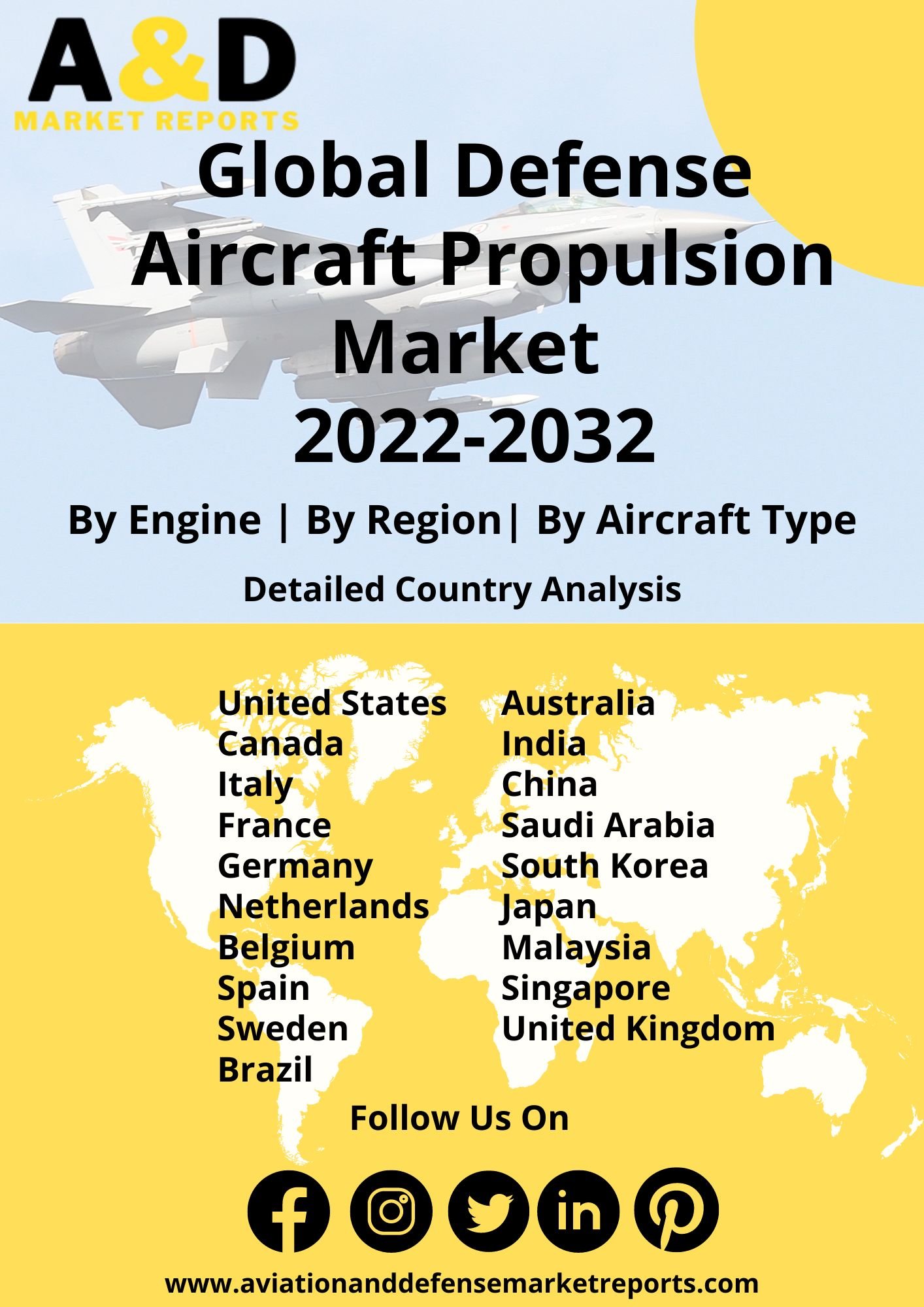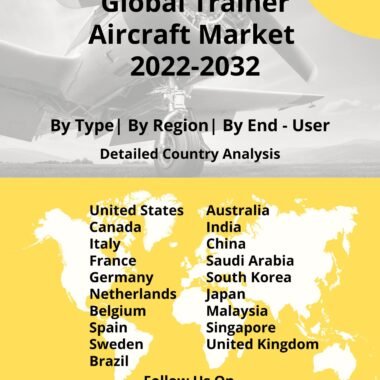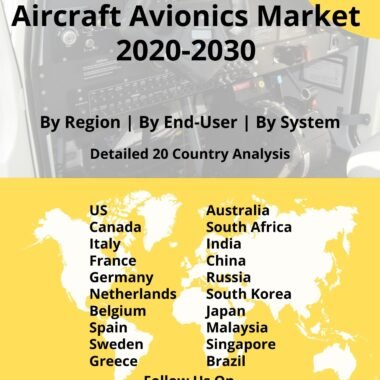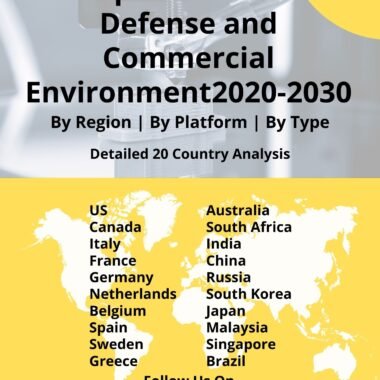Description
Defense Aircraft Propulsion Market
Frequently Asked Questions of Aircraft-Propulsion Market
Germany’s surrender in 1945 revealed significant wartime discoveries and advancements. General Electric and another American engine producer, Pratt & Whitney, contributed German teachings to those of Whittle and other British designers. Early jet engines, such as the ME 262, drank gasoline quickly. As a result, an initial challenge was posed construct an engine that could generate great thrust while using minimal fuel. In 1948, Pratt & Whitney solved this problem by integrating two engines into one. The engine included two compressors, each of which rotated independently, with the inner one providing high compression for optimal performance.
The advancement of fighter engine technology stagnated in the early 2000s. Engineers found it difficult to extract even minor gains in thrust or range out of fighter turbofan designs. Adaptive technology, which adds a third stream of airflow to the engine and allows it to be adjusted, provided a technique to accelerate the development of new engines.
Advanced technologies such as Hydrogen propulsion, open fan architecture, hybrid electric engines will also be one of the key upcoming technologies of the aircraft engines market. Alternative technology development is not restricted to civilian applications such as Urban Air Mobility or other commercial aircraft; military aircraft have always had a significant demand for more electrification. The impact of electric propulsion on airplane design may be more positive than previously anticipated. While directly replacing ICEs with electric motors may provide benefits like as simplicity, reliability, reduced noise, and lower maintenance costs, considerably greater benefits may be realized by leveraging the unique integration capabilities of electric-propulsion systems within the airframe. The ability of the EMs to be scaled down without considerable loss of efficiency, as well as the relative ease of distribution of electric power within the aircraft, is an advantage in and of itself.
Major factors driving Defense Aircraft Propulsion Market Growth
Ceramic matrix composites (CMCs) replace metal alloys in some key components, providing lighter weight higher temperature capacity This allows the engines to operate at higher temperatures and hence more effectively, without sacrificing durability. Additive manufacturing, often known as 3D printing, has also helped engineers unleash the design space. The adaptive technology permitted the ability to reconfigure, in flight, toward either a more fuel-efficient mode or a high-thrust mode.
Trends influencing the Defense Aircraft-Propulsion Market Size
Aircraft sustainment programs and development of new aircrafts is creating demand for upgraded engines and new engines that offer more power and more efficiency. More efficiency translates into more operational flexibility. There is also increasing demand for engines to power HALE and MALE UAVs, this will be one the key trends going forwards due to the significant cost benefits UAVs offer over traditional aerial platforms. The trend in the military is towards more electric aircraft. Unmanned systems that traditionally run on fossil fuel will be able to switch to electric propulsion for stealthier operation in hostile territory. This enables better operational effectiveness of unmanned systems engaged in ISR missions. Electric motors are also not dependent on air, they can operate at full potential even at high altitudes where the air is thin. Electric motors can also be smaller than their fossil fuelled counterparts. These market trends will influence the growth of the market during the forecast period.
Defense Aircraft-Propulsion Market Forecast & Dynamics
Increasing defense spending will drive the market for new procurement activities and upgrades to existing platforms with newer technologies and capabilities. The increase in defense spending will encourage procurement of new aircrafts. Procurement will also be driven by prevailing geo political conditions in Europe and the Asia Pacific. Proliferation of autonomous and unmanned platforms in these regions will be one of the key drivers of the aircraft engines market as per aircraft propulsion market analysis.
Defense-Aircraft Propulsion Market Analysis for Recent Developments
PTC Industries Limited and Safran Aircraft Engines signed a Memorandum of Understanding (MoU) to bridge the defense and civil aerospace sectors in India. PTC produces high-quality, precision metal components for a wide range of critical and super-critical applications. Safran is a French multinational corporation that designs, develops, manufactures, and maintains civil and military aircraft engines, as well as other aerospace and defense equipment. Under the terms of the agreement, the organizations will identify and develop prospects for cooperation and partnership on a variety of fronts in order to satisfy the projected needs of the military and aerospace industries.
Hermeus has completed a crucial test of a new engine design, bringing the startup one step closer to creating reusable hypersonic aircraft. The company’s engine, named Chimera, shifted between turbojet and ramjet power during a series of tests at the Notre Dame Turbomachinery Laboratory in Indiana. This is thought to be the first time a commercial company has made this change. Hermeus conducted the tests over a three-month period and accomplished the change from turbojet to ramjet many times. The trials were completed earlier this week.
Baykar, a Turkish defense corporation, announced the completion of its first jet-powered unmanned aerial combat vehicle (UCAV) flight. The company’s previous Bayraktar TB2 drone was notably featured in worldwide wars, propelling Baykar into the international spotlight and transforming it into a significant manufacturer and exporter. After their impact in Syria, Ukraine, and Libya, where their laser-guided armor-piercing bombs helped repel an onslaught by UAE-backed forces two years ago, international demand for Baykar’s propeller-driven drones skyrocketed.
General Electric (GE), an American multinational corporation, announced an agreement with India’s state-owned Hindustan Aeronautics Ltd (HAL) to manufacture fighter jet engines for the Indian Air Force (IAF). The historic agreement to facilitate the transfer of critical jet engine technologies was announced as Prime Minister Narendra Modi, who is currently on an official State Visit to the United States, prepared to address a joint meeting of the United States Congress on Capitol Hill in Washington, DC. The F414 military aircraft engine from GE powers cutting-edge fighters such as the Boeing Super Hornet and the Saab Gripen. The agreement to manufacture them in India for the LCA Tejas Mk2 marks a watershed moment in India-US relations, as well as the end of the “”technology denial regime.”” High altitude thrust shortfall performance, excess weight, and a “”mysterious noise”” were problems with the Kaveri turbofan engine. The noise that comes from the core’s overheating was unavoidable, but it made sense given the material.







